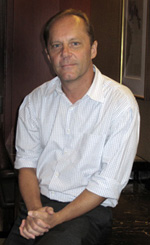

By Matt Cutugno
Indio, CA, USA
I.

Matt Cutugno
When I was growing up, I never heard of the concept of closure. It wasn’t yet common in our contemporary vocabulary. It seems to have been created a generation or two ago by some psychologist in an effort to offer people a magic pill:
“Have you lost a loved one, either unexpectedly or after a long illness? Don’t worry, over time you’ll gain closure.”
“Are you going through a contentious divorce? I sympathize, but you just need closure.”
“Did you lose your job; was the security blanket of employment yanked out from under you? Well, talk it over with a friend or someone in Human Resources and get closure.”
You see, the theory goes that if you have closure, you’ll know why things happened and you’ll feel better. Something tells me, however, that closure is an illusion.
II.
I dreamed about my father last night. He passed away four years ago this summer and he hasn’t appeared in my dream life for some time. When he does, he’s old, but not yet infirm. I see him when I’m transported in sleep to the house he built in South Jersey. I’m in a room and he’s sitting at a table. Initially, I’m thinking, “Dad is back, that’s nice.” Then I realize he’s not still alive. I note his unruly white hair, his red ears with their large fleshy lobes. I study the gnarled hands of a proud working man. I look into his distinctive hazel eyes; steely-gazed in youth, now dimmed. I give him my undivided attention, hoping he knows I’m a good son.
My father was larger than life. He was both a typical man of the Greatest Generation and an unlikely American original. He was the son of Italian immigrants and didn’t speak a word of English until he started school. He served with distinction in the 8th Army Air Force during World War II, flying 30 combat missions in Europe. He came home to Port Reading, New Jersey, got a job, got married and raised a family.
Though he had so much in common with others of his generation, my father had ideals all his own. He could spot a less-than-honest politician a mile away, and so he voted the man and not the party. He was of high moral principles and called out corporate greed when it was more common to believe what was good for General Motors was good for America. While not a natural feminist, he was an early admirer of Hillary Clinton and voted for Bill. He was a nature and animal lover and was thus opposed to recreational hunting. And though a union man his whole life, he deplored the excesses of union protectionism and corruption.
III.

Matt "Tug" Cutugno
My father died a couple months short of his 87th birthday. He suffered those last few years - he lost his wife of over 60 years to the brutalities of Alzheimer’s. He was her caregiver and that took its toll, even as his own health failed. Ultimately, he was beaten down, angry and bitter, which made things difficult for those of us closest to him.
The thing he felt most at the end was relief, and I felt that too. I was detached. I didn’t cry for him, though I had been a dutiful son. If you had asked me at the time, I would have told you I had already achieved closure.
In the months after his passing, his presence swirled in my mind. I wound up writing a book about his death and life. I called it The Winter Barbeque, and it takes place on his last day on earth as my father sits in the backyard of that home in Jersey. He barbeques at his hibachi, and relives his life. The book is told from his point of view - the first page says, “This is the book my father would have written.” When I finished it, I was happy for both of us, a son’s gift to a father. It was subsequently published and favorably received. I thought to myself, this must be what closure is.
But that was years ago, and now, not many days go by that I don’t think of him. I loved and respected the man and tried in my adult life to understand him. That part wasn’t easy, as he was a hard case. Afflicted by an ill temper, the world had a tough time measuring up in his mind. In his old age, I was guilty of dispensing “payback” for his bullying ways.
Now, I’m not sure what to do with my regrets.
IV.
But why closure anyway? Is the goal not to think about life’s losses? I prefer to focus on perspective rather than closure. Although the difference produces a fragile peace that comes and goes day-by-day, I continue to move forward.
Link:
Matt Cutugno's Profile at Stay Thirsty Publishing





